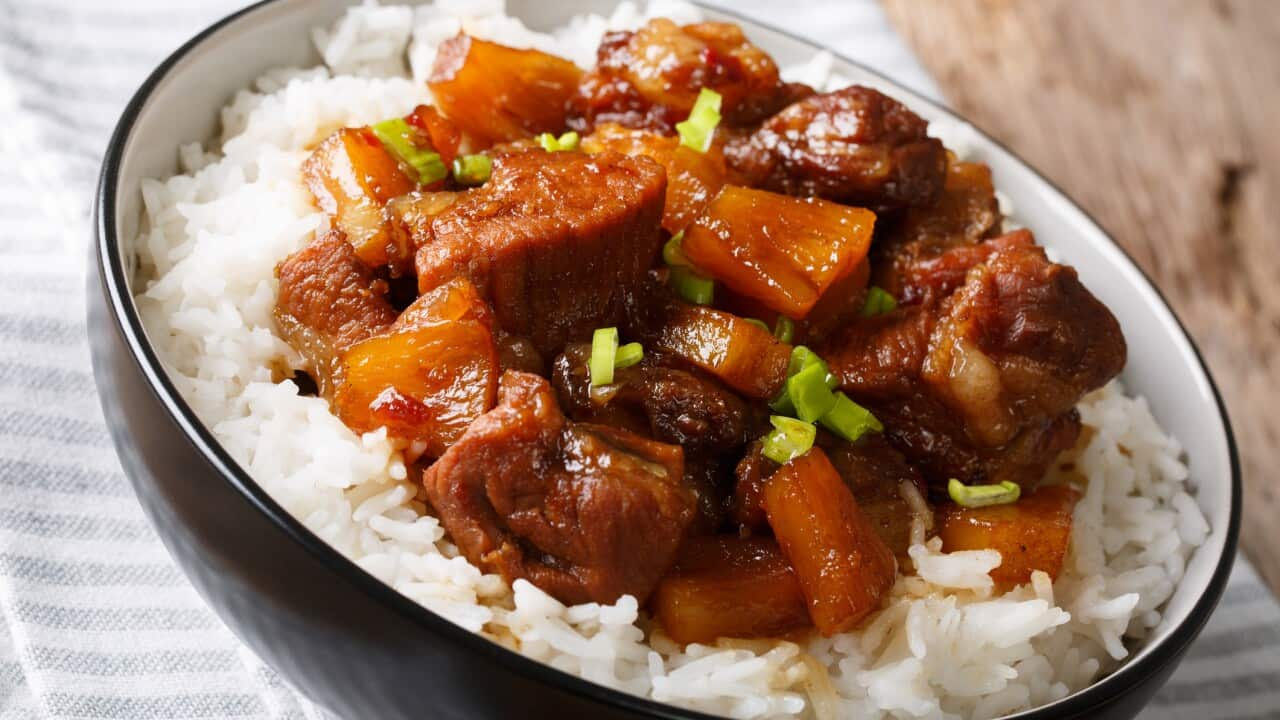Key Points
- Bibingka became a must-have snack after the Simbang Gabi.
- The bibingka may have Chinese roots as the name could be derived from the Hokkien root word 'bi' meaning uncooked rice.
- Bibingka pastries are a modern take on a traditional favourite.
Bibingka became a must-have snack after the Simbang Gabi, a nine-dawn mass which starts from the 16th to the Christmas eve, 24th December.
A Christian custom introduced by Spanish friars, early Filipino farmers relied on heavy cakes like bibingka for their post-worship breakfast as fuel for the day’s work.
A ritual carried on to this day where local churches will be lined by pop-up hawkers selling these delicacies for the early massgoers.
Traditionally made from a fermented rice flour batter, bibingka is often cooked in clay pots lined with banana leaves, using hot coals on the top and bottom, imparting a smoky flavour that enhances its rustic charm.
The etymology of the dish though is unknown; but according to historian and writer E. Arsenio Manuel, the bibingka may have Chinese roots as the name could be derived from the Hokkien root word “bi” meaning uncooked rice — the same origin for some Filipino dishes like bihon, bilo-bilo and biko.

Photo of freshly cooked Filipino delicacy called bibingka or ground glutenous rice cooked in coal pots Source: Getty / junpinzon
In Indonesia, another similar dish is called wingko also called wiwingka which is popular throughout Java.
Across the Philippines, variations also exist as the local produce encourages locals to create versions that have become classics on their own.
The classic bibingka uses galapong or ground glutinous rice flour which gives the bibingka a unique texture, topped with salted duck egg and grated cheddar cheese.
Popular varieties include generous toppings of Queso de Bola, ube bibingka which incorporates purple yam, and some use sweet potato providing a subtle earthy sweet flavour.
In recent years, modern twists on the classic bibingka have emerged. Some variations include adding chocolate, or matcha to the batter. Others experiment with different toppings like fruits, nuts, or caramel. These innovative approaches have helped to keep bibingka relevant and appealing to a wider audience.
While there are now restaurants and bakeshops around Australia that sell these delicacies, you can still create the nostalgia of bibingka at home using store-bought pastry!
Bibingka Pastry
This is an easy dish if you prepare then set aside all the ingredients ahead, and bake the pastries an hour before serving.

Bibingka pastries are best eaten an hour after baking. Credit: Anna Manlulo
Ingredients:
2 sheets store-bought puff pastry
125 grams (½ cup) brown sugar
250 grams (1 cup) grated coconut
250 grams (1 cup) grated cheddar cheese (more if preferred)
1 salted duck egg, chopped
1 egg, beaten with 1 tablespoon water (for brushing before baking)
125 ml (½ cup) coconut cream
Instructions:
1. Preheat oven to 180*C
2. Thaw the frozen pastry sheets for approximately 10 minutes. Cut each pastry sheet into nine equal squares.
3. Place on a lined baking tray. Brush the pastry squares with egg wash. Bake in the oven until golden, approximately 15-20 minutes. Set aside to cool for 5 minutes.
4. Using a pastry brush, generously coat each pastry square with the coconut cream.
5. Add the toppings in this order: grated coconut, cheddar cheese, chopped salted duck egg.
6. Sprinkle with brown sugar Serve on a platter lined with banana leaves (optional).











